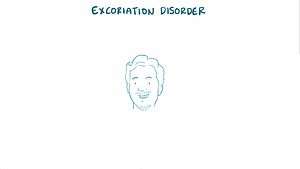Body-focused repetitive behavior
| Body-focused repetitive behavior | |
|---|---|
|
Video explanation | |
| Classification and external resources | |
| ICD-10 | Xxx.x |
| ICD-9-CM | xxx |
Body-focused repetitive behavior (BFRB) is an umbrella name for impulse control[1] behaviors involving compulsively damaging one's physical appearance or causing physical injury.[2]
The main BFRB disorders are:[3]
- Trichotillomania, hair pulling
- Trichophagia, hair nibbling
- Trichotemnomania, hair cutting
- Dermatillomania, skin picking
- Dermatophagia, skin nibbling
- Onychotillomania, nail picking
- Onychophagia, nail biting
- Morsicatio Buccarum, cheek biting
- Morsicatio Labiorum, inner lip biting
- Morsicatio Linguarum, tongue biting
BFRB disorders can also include Rhinotillexomania (compulsive nose picking).[2] BFRB disorders are not generally considered obsessive-compulsive disorders.[3]
Causes
The cause of BFRBs is unknown. Emotional variables may have a differential impact on the expression of BFRBs.[4] Researchers are investigating a possible genetic component.[1][5]
Onset
BFRBs most often begin in late childhood or in the early teens.[2]
Prevalence
BFRBs are among the most poorly understood, misdiagnosed, and undertreated groups of disorders.[6] BFRBs may affect at least 1 out of 20 people.[2] Trichotillomania alone is believed to affect 10 million people in the United States.[7]
Treatment
Treatment can include behavior modification therapy, medication, and family therapy.[1][2] The evidence base criteria for BFRBDs is strict and methodical.[8] Individual behavioral therapy has been shown as an "probably effective" evidence-based therapy to help with thumb sucking, and possibly nail biting.[8] Cognitive behavioral therapy was cited as experimental evidence based therapy to treat trichotillomania and nail biting.[8] Another form of treatment that focuses on mindfulness, stimuli and rewards has proven effective in some people. However, no treatment was deemed well-established to treat any form of BFRBDs.[8]
See also
References
- 1 2 3 Scientific Advances in Trichotillomania and Related Body-Focused Repetitive Behaviors Archived July 21, 2011, at the Wayback Machine., November 4, 2004, National Institute of Mental Health
- 1 2 3 4 5 AAMFT Consumer Update - Hair Pulling, Skin Picking and Biting: Body-Focused Repetitive Disorders, American Association for Marriage and Family Therapy
- 1 2 Trichotillomania (TTM) & Related Body-Focused Repetitive Behaviors (BFRBs), The Center for Emotional Health of Greater Philadelphia
- ↑ Teng; et al. (2004), "Body-Focused Repetitive Behaviors: The Proximal and Distal Effects of Affective Variables on Behavioral Expression", Journal of Psychopathology and Behavioral Assessment
- ↑ ABC News 20/20 Hair Pulling, 2006
- ↑ Families & Health Archived March 28, 2009, at the Wayback Machine., American Association for Marriage and Family Therapy
- ↑ Diefenbach GJ, Reitman D, Williamson DA (2000). "Trichotillomania: A challenge to research and practice". Clinical Psychology Review. 20 (20): 289–309. doi:10.1016/S0272-7358(98)00083-X. PMID 10779896.
- 1 2 3 4 Woods, Douglas W.; Houghton, David C. (13 July 2015). "Evidence-Based Psychosocial Treatments for Pediatric Body-Focused Repetitive Behavior Disorders". Journal of Clinical Child & Adolescent Psychology: 1–14. doi:10.1080/15374416.2015.1055860.
